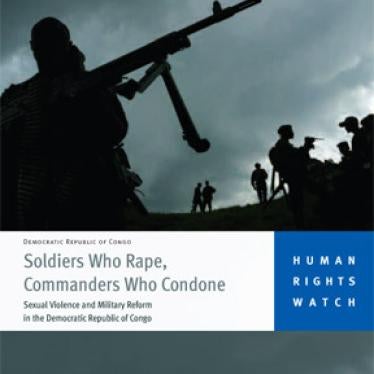His Excellency Adolphe Muzito
Prime Minister
Democratic Republic of Congo
Your Excellency,
I write to you today both to commend the government of the Democratic Republic of Congo for the positive action recently taken to hold to account perpetrators of sexual violence, but also to express our profound concern at recent attacks leveled at the media and human rights organizations, including Human Rights Watch, which undermine progress on respect for human rights.
Human Rights Watch takes great pride in our honest and constructive relationship with the Congolese government. Like many local and international human rights organizations, your government for a number of years has expressed concern about the widespread use of sexual violence against women and girls by armed groups as well as soldiers of the Congolese army. As you may recall, Human Rights Watch expressed concern earlier this month that there had been little progress on senior commanders being prosecuted for rape, despite the increase in rape trials of lower-ranking soldiers.
We therefore welcome the government's July 4 announcement of "zero tolerance" for human rights abuses, including rape, by government soldiers. We are also pleased to hear of the government's commitment to holding to account those commanders who permit their troops to carry out such abuses. We learned recently that two officers in Rutshuru, North Kivu, were found guilty by a military court on July 27 for rape. We hope that more investigations and trials of senior officers implicated in serious crimes will follow. Ending the culture of impunity for human rights abuses, including crimes of sexual violence, are essential to building the rule of law in Congo. We commend your government for the progress it is making in this regard.
That progress, however, is undermined by the public attacks on human rights organizations and the media whose role it is to expose such violations. The Minister of Communications and the Media, Lambert Mende, at a July 28 press conference in Kinshasa made baseless and unsubstantiated statements against Human Rights Watch, other international human rights organizations and Radio France Internationale. The minister labeled Human Rights Watch and other international organizations as "humanitarian terrorists" who "repeat lies," intent on "destabilizing" the country, "demoralizing" the government army and "balkanizing" the Congo. Minister Mende claimed that Human Rights Watch reports on human rights abuses were done for "political and financial" motives. These allegations are both unfair and untrue.
Human Rights Watch has worked in Congo for over 15 years to join forces with Congolese people to promote justice and respect for human rights. During this time, we have consistently exposed human rights abuses by all groups, whether foreign armies, rebel groups, local militias or government security forces. Our aim is to stand together with Congolese victims and activists to protect people from unlawful conduct in wartime, to uphold basic freedoms, and to bring offenders to justice.
Beyond Congo, Human Rights Watch is one of the world's leading independent organizations dedicated to defending and protecting human rights. Our investigations are rigorous and objective, and they aim to give voice to those whose rights have been violated. We work to hold those responsible to account for their crimes. For over 30 years we have worked in more than 80 countries around the world, including in recent trouble spots such as Afghanistan, Burma, Iraq, Sri Lanka, Sudan and many others to expose human rights violations and to encourage change.
The responsibility to uphold human rights lies with governments. We therefore challenge governments, such as yours in Congo, to respect international human rights and humanitarian law and to end abusive practices. This requires a variety of tactics including public exposure, advocacy, and building partnerships with those who also seek change. Governments may not like having the abusive practices exposed, but criticizing without basis human rights activists and journalists who document such abuses is the mark of a repressive government, rather than one intent on establishing a state which respects human rights.
The tone of the press conference by the Minister of Communication and the Media was markedly different from Human Rights Watch's fruitful discussion with President Joseph Kabila on July 2 in Goma and other recent interactions with government ministers. In those discussions, we were impressed by the personal engagement of senior officials to bring about change and to end Congo's culture of impunity. Denouncing human rights organizations that independently document abuses, restricting press outlets such as Radio France Internationale, and arbitrarily arresting human rights activists such as Golden Misabiko from ASADHO in Katanga, indicates that President Kabila's personal commitment to justice is being undermined rather than embraced by the government. This is most unfortunate.
We urge you to fully implement national and international laws that guarantee freedom of expression, freedom of the press, and protection for human rights defenders. Elections themselves do not bring democracy. Congolese and international actors need to work together to establish an independent judiciary, a vibrant parliament, and a free press to improve human rights, ensure the government is accountable for its actions, and open political space for civil society. Human Rights Watch is committed to helping both the Congolese government and its people achieve these important goals. We look forward to a productive relationship with you in this endeavor, and ask you for your continuing respect for the work of human rights organizations, such as Human Rights Watch, and for the human rights ideals we espouse.
Yours sincerely,
Anneke Van Woudenberg
Senior Researcher
Cc:
His Excellency, President Joseph Kabila Kabange
His Excellency, Upio Kakura, Minister of Human Rights
His Excellency, Lambert Mende, Minister of Communications and the Media
His Excellency, Luzolo Bambi Lesa, Minister of Justice






